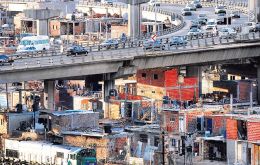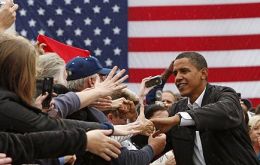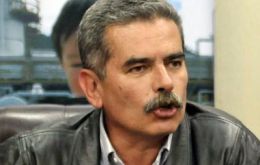MercoPress. South Atlantic News Agency
Economy
-
Wednesday, August 11th 2010 - 05:51 UTC
Uruguay concerned with labour demands and fishing vessel seizures in Montevideo

Alleged labour disputes involving hundreds of thousands of US dollars have left seven Spanish fishing vessels legally stranded in Montevideo, threatening the reputation of Uruguay’s main port to continue as a South Atlantic fisheries hub.
-
Tuesday, August 10th 2010 - 14:19 UTC
Since last year Chilean women are a majority in higher education and increasing

Last year was the first time that a majority – 51% - of all higher education students in Chile were women, the Education Ministry reported last week.
-
Tuesday, August 10th 2010 - 11:51 UTC
Basic Foods’ Basket in Argentina increased 35.9% in twelve months

The Basic Foods Basket, CBA, an index from Argentina’s Foundation for Latin American Economic Research (FIEL) increased 0.6% in July compared to the previous month, 21% in the first seven months of the year, and 35.9% over a year ago.
-
Tuesday, August 10th 2010 - 11:39 UTC
Chilean economy recovering strongly shows Central bank data

Chile’s Central Bank released the Economic Activity Index (IMACEC) results for June on Sunday showing an increase in economic activity of 6.8%, over June 2009. The results showed an increase in activity across the board — from the transportation and electric industries, to gas and water.
-
Tuesday, August 10th 2010 - 01:30 UTC
Argentina confident it can issue debt in US dollars below 9% interest rate

Argentine Economy Minister Amado Boudou confirmed what newspaper Ámbito Financiero had anticipated a week ago: the plan is to issue debt in US dollars but below the 9% mark, which with the current panorama may allow for an even lower percentage index.
-
Monday, August 9th 2010 - 07:46 UTC
Argentina's warning to would-be Euro deserters

The tensions between the eurozone's north and south, and the complex and politically costly transfers of money required to dampen the euro crisis, have led many people to think the unthinkable: saving Europe's common currency may require that some countries abandon it.
-
Monday, August 9th 2010 - 07:36 UTC
To spend or not to spend: Is that the main question?

The debate over fiscal policy has reached a fork in the road. One way leads to maintaining or increasing the fiscal stimulus. This column argues that policymakers should take the other path. This would mean phasing out government expenditure while phasing in social protection programmes at the risk of a double-dip recession but potentially resulting in a more vibrant economy.
-
Saturday, August 7th 2010 - 06:03 UTC
Employment in US down; fears about strength of economic recovery

Employment in the United States fell for a second straight month in July as more temporary census jobs ended while private hiring rose less than expected, pointing to an anaemic economic recovery.
-
Saturday, August 7th 2010 - 00:43 UTC
Brazil ready to confirm another record crop: 147.1 million tons

Brazil is poised to confirm its largest crop ever, 147.1 million tons in 2009/2010, which is 9% higher that the 135.1 million of 2008/09 according to the latest survey from Conab, the country’s National Supply Agency. The latest record was in 2007/08 with 146 million tons.
-
Friday, August 6th 2010 - 22:20 UTC
Bolivia’s gas reserves ‘comfortably’ sufficient for the next twenty years

Bolivia’s proven gas reserves stand at 19 trillion cubic feet, which means the country can address domestic and foreign demand comfortably during the next 20 years announced Friday by Energy and Hydrocarbons minister Fernando Vincenti.
